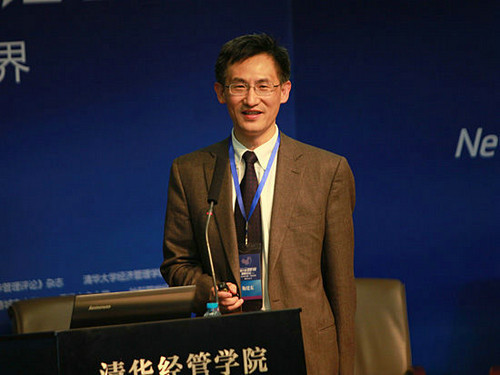


Chinese scholar Ju Jiandong has been nominated as a Nobel Economic Prize candidate for his contributions in economic theory, including the intertemporal model and the balance of payments.
Ju combined the dynamic intertemporal model in macroeconomics with the structural analysis model in microeconomics, and has constructed a dynamic structural analysis method, which he applied to the international balance of payments theory. He did this work in cooperation with Professor Wei Shangjin of Columbia University and Professor Shi Kang at the Chinese University of Hong Kong.
Currently a professor at the Tsinghua University School of Economics and Management, Ju studied and worked in the U.S. for 25 years. In 2014, he returned to China to become dean of the International Business Management School of Shanghai University of Finance and Economics.
Ju discovered that it was the balanced phenomenon of economic structural differences between developed countries and developing countries that contributed to the international balance of payment surpluses in developing countries. By applying this theory to the industrial dynamic structural theory with Professors Justin Yifu Lin and Wang Yong of Work Bank and Hong Kong University of Science and Technology, Ju created a dynamic model for industry upgrades and economic structural adjustment.
Ju was nominated for the Nobel by Professor Xie Danyang of Hong Kong University of Science and Technology and Wuhan University.
 Fire brigade in Shanghai holds group wedding
Fire brigade in Shanghai holds group wedding Tourists enjoy ice sculptures in Datan Town, north China
Tourists enjoy ice sculptures in Datan Town, north China Sunset scenery of Dayan Pagoda in Xi'an
Sunset scenery of Dayan Pagoda in Xi'an Tourists have fun at scenic spot in Nanlong Town, NW China
Tourists have fun at scenic spot in Nanlong Town, NW China Harbin attracts tourists by making best use of ice in winter
Harbin attracts tourists by making best use of ice in winter In pics: FIS Alpine Ski Women's World Cup Slalom
In pics: FIS Alpine Ski Women's World Cup Slalom Black-necked cranes rest at reservoir in Lhunzhub County, Lhasa
Black-necked cranes rest at reservoir in Lhunzhub County, Lhasa China's FAST telescope will be available to foreign scientists in April
China's FAST telescope will be available to foreign scientists in April "She power" plays indispensable role in poverty alleviation
"She power" plays indispensable role in poverty alleviation Top 10 world news events of People's Daily in 2020
Top 10 world news events of People's Daily in 2020 Top 10 China news events of People's Daily in 2020
Top 10 China news events of People's Daily in 2020 Top 10 media buzzwords of 2020
Top 10 media buzzwords of 2020 Year-ender:10 major tourism stories of 2020
Year-ender:10 major tourism stories of 2020 No interference in Venezuelan issues
No interference in Venezuelan issues
 Biz prepares for trade spat
Biz prepares for trade spat
 Broadcasting Continent
Broadcasting Continent Australia wins Chinese CEOs as US loses
Australia wins Chinese CEOs as US loses